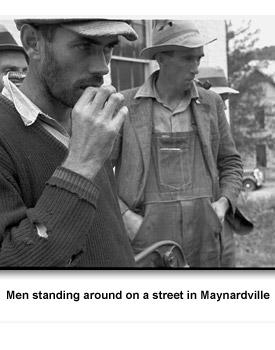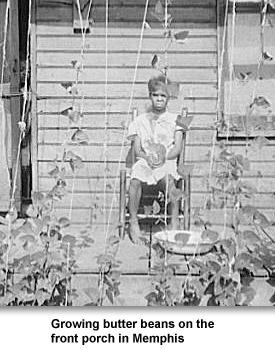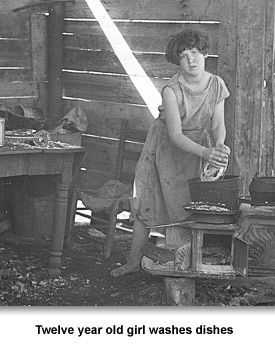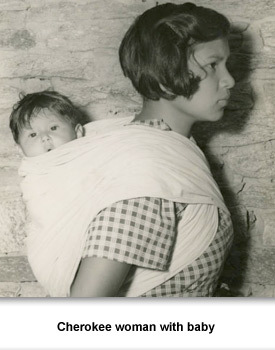The Great Depression & WW II
Hard Times
The Great Depression had a significant and negative effect on the lifestyles of many Tennesseans—both in the cities and on farms.
From the rich to the poor, people found themselves having to figure out how to make do with less. Life changed drastically. People had to adapt to the changing times.
For some, the changes and loss of their money was too much to bear. When the stock market crashed in October 1929, many people lost a lot of money. Some of the bankrupt businessmen, who could not accept life without riches, committed suicide.
The Depression reached Tennessee in 1930 when the Caldwell banks collapsed. People with money in the banks lost all their life’s savings.
The Depression reached Tennessee in 1930 when the Caldwell banks collapsed. People with money in the banks lost all their life’s savings.
The collapse of the stock market and banks affected businesses. They had to close or reduce their work force. This caused many people to lose their jobs. And they couldn’t find new jobs. People moved from place to place seeking work, often unsuccessfully.
The lack of jobs was widespread. Factory workers, bankers, farmers, and teachers—all different kinds of workers had a difficult time finding work.
People scrambled to find a way to support their families. Men who had previously had an office job took menial jobs such as cooking and cleaning. Memphis’s government supplied boxes of apples that men could sell on the streets. With whites taking jobs traditionally done by African Americans, black men especially had a hard time finding work.
This was a particularly difficult time for children. As economic problems placed stress on families, many children found themselves in desperate situations. Some took to the road traveling from place to place in train boxcars. Others worked to earn as much money as they could for their families.
Even in the most trying times, people found ways to entertain themselves and have a good time. Radio programs and movies provided ways to temporarily escape from the hardships of everyday life. Sports, both in college and professional, were enjoyed by many people.
Picture Credits:
- Twelve year old girl washes dishes in her family’s crude lean-to kitchen in Tennessee in 1936. Photographer was Carl Mydans, who worked in New Deal projects. Library of Congress
- Family leaves home in Ridgeley, Tennessee, in 1937, as flood waters threaten their home. Photographer was Edwin Locke. Library of Congress
- A young woman sits on her family’s front porch in Memphis in 1938 with butter bean vines growing up the porch. During the Depression, families in the city attempted to grow some of their food. Photographed by Dorothea Lange who worked on New Deal projects.
- Children pump water from a well that is the town’s sole water supply in Wilder, Tennessee, located in Fentress County. The image is credited to the Franklin D. Roosevelt Library.
- Men standing around on a street in Maynardville, Tennessee, in 1935. Photographed by Ben Shahn who worked on New Deal projects. Library of Congress
- A 1939 photograph of a Cherokee, Luzene Washington, carrying her baby strapped to her back in the traditional manner. Tennessee Department of Conservation Photograph Collection, Tennessee State Library and Archives
The Great Depression & WW II >> The Great Depression >> Hard Times >>






 Sponsored by: National Endowment for the Humanities
Sponsored by: National Endowment for the Humanities